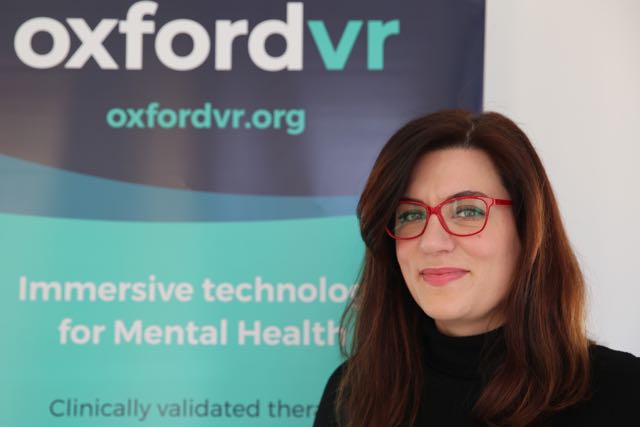Five minutes with Katie Bedborough at Oxford VR
January 22, 2020

We spent five minutes with Katie Bedborough, COO and CFO of new-kid-on-the-virtual-block, Oxford VR.
Started in 2016, Oxford VR is a healthcare company that develops evidence-based automated psychological treatments using state-of-the-art immersive virtual reality – or VR – technology. In other words, they treat patients with a variety of mental health conditions – like fear of heights or psychosis – by creating virtual scenarios in which psychological difficulties occur. “The thing is”, says Katie, “with traditional face-to-face therapies, it just isn’t practical to take people into these situations. A key benefit of VR is that it allows the patient to experience situations they find troubling in a safe, controlled environment – allowing them to take the risk but without actually taking a risk. The critical thing is that the learning made in the virtual world transfers into the real world.”
The idea was developed by Daniel Freeman, Professor of Clinical Psychology at the University of Oxford and a pioneer in the use of virtual reality to understand and treat mental health problems. His proof of concept work was on acrophobia – that’s fear of heights to you and me – “to test the efficacy of an automated cognitive intervention by an avatar or virtual coach” to help cure the condition. He published a subsequent paper in The Lancet in July 2018 and the results were overwhelming – after six 30-minute VR sessions, patients’ fear of heights was reduced by about two-thirds.
Freeman realised there was a commercial opportunity for his work when VR headsets became more readily available and mental health issues moved more into the mainstream. A University of Oxford spin-out, Oxford VR was set up with funding and support from Oxford University Innovation (OUI) and Oxford Sciences Innovation (OSI). They raised seed funding in 2017 with a further funding round in August 2018.
Oxford VR have two main projects underway – one on acrophobia and the other called GameChange. Their VR-enabled cognitive behavioural therapy (or CBT) for acrophobia is becoming established and is now available through NHS clinicians via the IAPT service in five areas – Oxfordshire, Berkshire, Bristol (Oasis Talking Therapies), Cambridgeshire and Peterborough. For videos showing patients before and after treatment, see here: https://vimeo.com/304412747; https://vimeo.com/304412693
The £4 million GameChange project is being run in partnership with the University of Oxford and the UK National Institute of Health Research. It’s a large scale, multi-site trial of their VR programme to help those with psychosis overcome the anxieties of day-to-day life – like doing the shopping, speaking to other people and getting on the bus. Virtual reality takes patients into sophisticated simulations of these real-life scenarios they find troubling alongside a virtual coach. Each year the NHS cares for over 200,000 people with psychosis and the estimated costs of treatment will be in the region of £4 billion by 2026. The automated nature of the Oxford VR treatment for psychosis could provide a low-cost option to complement existing care. GameChange hopes to demonstrate the clinical value of Oxford VR’s programme and implement a roadmap for VR therapy to use in the NHS nationwide.
When Katie joined the company in February 2018 there were four members of staff. The last head count was almost 40. Employees are split between the office in OCFI and a larger London base. The company is run from Oxford but the prototyping work is carried out in London Farringdon, where they employ a large number of developers from the gaming industry.
“Oxford VR’s vision,” says Katie, “is to transform mental health treatment for millions. We have high quality, evidence-based psychological treatments for many mental health problems but we don’t have enough skilled clinicians to deliver them. Oxford VR’s tech-enabled solutions improve access for patients in a tangible and scalable way.”
As of this week, Oxford VR has secured £10m series A funding to accelerate the US expansion of its VR therapy and to continue to expand its treatment pipeline.
Outside their partnerships with the NHS, Oxford VR is now partnering with clinicians further afield – Europe, Hong Kong and USA. The world is their (virtual) oyster. We wish them the best of luck.
If you want to find out more about Oxford VR, go to: https://ovrhealth.com
To see an interview with Oxford VR’s CEO, Barnaby Perks, see:
If you want to find out more about our Oxford Centre for Innovation.



